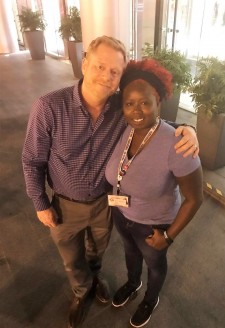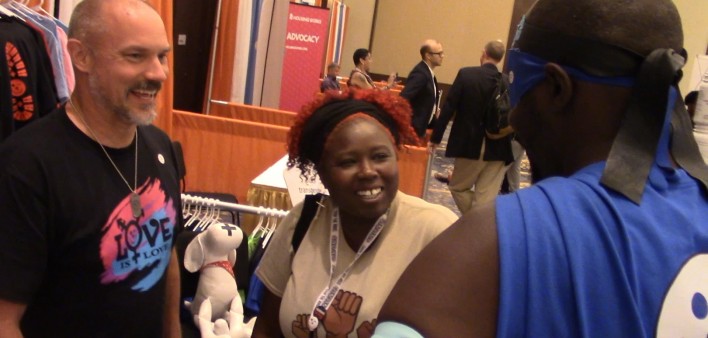Hearing Takia tell me about her short journey with HIV – she tested HIV positive just a few months ago – was the easy part for me. She and I met on the first day of the United States Conference on AIDS (USCA) in one of those random introductions that happens nearly every moment of the event.
The hard part was introducing her to other people. I couldn’t share her story without breaking into tears. It became a running joke between us, and a problematic one, because Takia had agreed to let me tell her story on video and I was connecting her to people left and right.
Takia is a working mother living in North Carolina. When she learned she was positive after a routine test before a blood donation at the Red Cross, she channeled her emotions into finding out everything she could about HIV. She got online, first to POZ Magazine and eventually to every site you can think of, and she soon learned that The Black AIDS Institute had scholarships to the 2017 United States Conference on AIDS.
Takia applied for a scholarship and got one. Within weeks, the newly diagnosed woman traveled to Washington, DC, for the largest AIDS conference in the country. Alone.
What triggered my emotions when I introduced Takia to someone at USCA is still hard to pinpoint. I feel for her diagnosis and the immediacy of it, certainly, but it is her response to all of this that makes my eyes well up. She instinctually followed a path of education and self-empowerment that advocates have been teaching the newly diagnosed since the crisis began.
There’s something about Takia that also confounds commonly held beliefs about how equipped a black woman in the south might be to handle her diagnosis. Takia does not need rescuing, thank you. She needs resources. She found enough of them online to begin her journey, but surely more will be required, in practical and human ways, for her to get the support that will bolster her as she moves forward.

Mark and Takia (photo: Dr. David Morris)
Watching the delegates of USCA respond to Takia might be the biggest gift I have ever received in 25 years of attending this conference. They took her hand and listened, they pulled her close, they offered advice and shared their own experiences. They loved Takia immediately because they knew exactly who she was from the moment they met her.
There is nothing so powerful, the early AIDS activist Michael Callen once said, as the magic that happens when people with HIV are together. Seeing advocates, positive and negative alike, show the best of ourselves to Takia, well, I have never been so proud of my HIV community and of our humanity toward one another.
That humanity is a wondrous crazy quilt of colors and identities. Takia, who can count on one hand the number of gay men she has known, was greeted at USCA by an avalanche of gay men, lesbians, feminists, transgender men and women, and every possible shade of gender expression. She welcomed it with the acceptance her deep faith has bestowed upon her. She explained to me that she doesn’t need to understand someone to love them. For Takia, it is just that simple. The purity of that attitude inspires me.
I worry for Takia. It would be unrealistic if I didn’t. I preemptively hurt for the pain she will experience, and we all know she will, after someone makes an ignorant remark, or a friend disappoints her, or she feels the rejection that wounds us in a way that only a person living with HIV can know.
There is also a fine line between sharing her story with you and exploiting someone who does not know what they do not know, not just yet. We discussed this often during our week together and she has given the thought of my telling her story on video a lot of prayerful consideration. She has decided to take this chance because there are risks, too, in remaining silent.
So please, meet my friend, Takia. She may be new around here, but I think she’s got this.
Mark








Comments
Comments